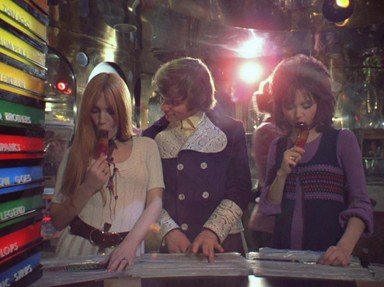Quiz Answer Key and Fun Facts
1. Alex, that is the film's main character and narrator, has three droogs, that is Pete, Georgie, and a third. According to the book, he is so named because he is as he's called. What's his name?
2. We can't have a "Clockwork Orange" quiz without a touch of the old Nadsat, the slang spoken by its teenage hooligans. The language perfectly showcases the degradation in this society's sense of right and wrong in aesthetics and morality. I give you this example: which of these words with a negative connotation in English means "good" or "great" in Nadsat?
3. Besides the language, there appears to be degeneration in the arts as well. One of the first crimes we see Alex committing is in a completely trashed playhouse. One of the Ludovico films Alex watches he calls a "professional piece of sinny", which suggests something about the state of cinema. As for music, while Alex is a stalwart lover of Ludwig Van Beethoven, the top-selling artists we see sound, at least in name, like twee feel-good pop group parodies. What are the three groups that the ladies at the record store mention to Alex?
4. Alex's droogs become unhappy with his leadership, and Georgie stages a coup. As Alex leaves the home of the "catlady" at the Health Farm, Dim, acting as Georgie's muscle, whacks him good with an instrument that seems fitting. What does he use?
5. When Alex is imprisoned, he learns of the experimental Ludovico Technique. Prisoners subjected to the Ludovico can have their sentences commuted to just a few weeks. Shortly after this, the Minister of the Interior visits the prisoners. As an aside, he explains why the current Government must promote "curative" techniques that get criminals back on the streets. What reason does he give?
6. How does the Minister of the Interior find out that Alex is a big fan of Ludwig Van?
7. Burgess gave a number of different explanations for the title, but a recurring theme was that "Clockwork Orange" implies something that is both natural, yet mechanical - a living thing with no free will. This is certainly on display after the Ludovico is performed. Before he's released, Alex is paraded on stage in front of prison and government officials, forced to lick a man's boot and retch before a naked woman. Who speaks up in outrage that the Ludovico has stripped Alex of his free choice?
8. Once Alex is released back into the world, things go badly for him. Being unable to stomach even retaliatory violence, he wanders aimlessly while stumbling coincidentally into people he's wronged. Eventually he tries killing himself and lands in a coma. When he awakes, he tells his therapist about a dream he's had. What's the dream?
9. In the movie's final scene, the Minister tries to win Alex over by proving how useful a friend the government can be. He tells him that a certain person who's wronged Alex has been taken as political prisoner. Who?
10. By the end of the movie "A Clockwork Orange", Alex is still completely unable to enjoy any of Beethoven's music.
Source: Author
etymonlego
This quiz was reviewed by FunTrivia editor
jmorrow before going online.
Any errors found in FunTrivia content are routinely corrected through our feedback system.
